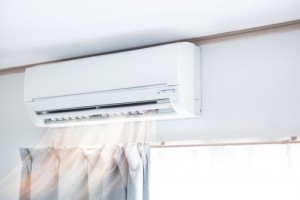
The sun-kissed days of summer have arrived, bringing a combination of higher temperatures, and higher energy bills — as the heat keeps you running your HVAC system at full power. Fortunately, there are steps you can take to stop burning cash as the temperatures rise.
As new standards for residential air conditioning continue to focus on energy efficiency, now is the perfect time to update your home cooling system to ensure a pleasant summer, while reducing your energy costs (and your carbon footprint).
Here are some things you can do to minimize energy bills this season — without compromising on comfort:
1. Consider an Energy Audit
Can’t remember the last time you updated the cooling systems in your home? Having your residence inspected by a professional energy auditor can give you insight into where you’re losing the most cash. Experts will use high-tech equipment to discover leaks around the property that you might not have noticed; and to find areas where insulation might not have been properly installed.
While the audit alone won’t instantly improve your energy efficiency, it will let you know exactly where you should start to improve and upgrade your systems.
2. Invest in a High-Efficiency HVAC System
While upgrading your HVAC system may seem like an unwanted expense, it’s a process that can quickly pay for itself in the right circumstances. Professionals suggest you can reduce your air conditioning’s energy use by 20-50%, simply by switching to an energy-efficient HVAC solution.
When you’re looking for the ideal upgrade, remember that central AC units are rated for efficiency with a Seasonal Energy-Efficiency Ratio, or SEER, number. If you double your existing SEER, you essentially cut your current AC operating costs in half.
3. Insulate Ducts
The ducts responsible for moving air through your heating system can be huge energy-wasters, if they aren’t properly sealed and insulated. Every piece of missing insulation, and every potential leak, forces your AC to work harder to achieve your desired temperature — boosting your energy costs.
Begin by sealing ducts that run through the attic, unheated basement, or crawlspace; then move on to other areas around the home. Once they’re sealed, you’ll be able to wrap the ducts in insulation to prevent them from getting too hot in summer, or too cold in winter.
4. Reduce Excessive Sun Exposure
Much of the heat that accumulates within your home comes from exposure to the sun, as it shines on your windows and rooftop. Therefore, one of the best ways to help your HVAC system — and beat the heat — is to close your blinds and curtains throughout the day to reduce passive heating.
It’s a good idea to plant bushes and leafy trees around the building, to reduce the amount of sun that can directly hit your home. According to the U.S. Department of Energy, when trees and shrubs surround your air conditioner, you can improve AC efficiency by around 10%.
5. Install a Programmable Thermostat
Programmable thermostats are useful for energy saving, because you can set them to be cooler when you’re home, and warmer while you’re away. In fact, the correct settings on a programmable thermostat can save you up to $180 in energy bills each year.
Remember, when you get home and want to cool the house quickly, setting the thermostat to a colder temperature won’t bring ideal comfort any faster. The only thing it will result in is increased energy costs, and excessive cooling — for optimal results, without wasted energy, set the thermostat to exactly the temperature you desire.
6. Help Your HVAC with a Fan
If you use your air conditioning regularly, a ceiling fan may help you cut costs by allowing you to raise the temperature setting by a number of degrees without reducing your comfort. Just remember to turn the fan off when you leave the room — fans cool people, not rooms, through a wind chill effect.
When you bathe or shower, use the fan in the bathroom to remove the humidity and heat from the room; or open a window, to reduce the energy your HVAC system has to use.
Achieving Energy Efficient Summer Cooling
With the tips above, and regular HVAC maintenance, you can achieve more energy-efficient summer cooling — a win for your wallet, and for the environment. Remember to change the air filter on your AC unit at least once every six months, as dirty filters cause systems to work harder than normal. The occasional professional tune up will help your system run smoothly for years to come.

 FREE Live Music and Family Fun at Allied Gardens First Fridays The next Allied Gardens First Fridays Summer Concert in the Park is just around the corner. Grab your lawn chairs, bring a picnic, and get ready to meet your
FREE Live Music and Family Fun at Allied Gardens First Fridays The next Allied Gardens First Fridays Summer Concert in the Park is just around the corner. Grab your lawn chairs, bring a picnic, and get ready to meet your  Ideal Plumbing Heating Air Electrical Named Winner of 2023 Better Business Bureau Torch Awards for Ethics in San Diego (San Diego, CA – September 15, 2023) Better Business Bureau Serving the Pacific Southwest (BBB) has named Ideal Plumbing Heating
Ideal Plumbing Heating Air Electrical Named Winner of 2023 Better Business Bureau Torch Awards for Ethics in San Diego (San Diego, CA – September 15, 2023) Better Business Bureau Serving the Pacific Southwest (BBB) has named Ideal Plumbing Heating